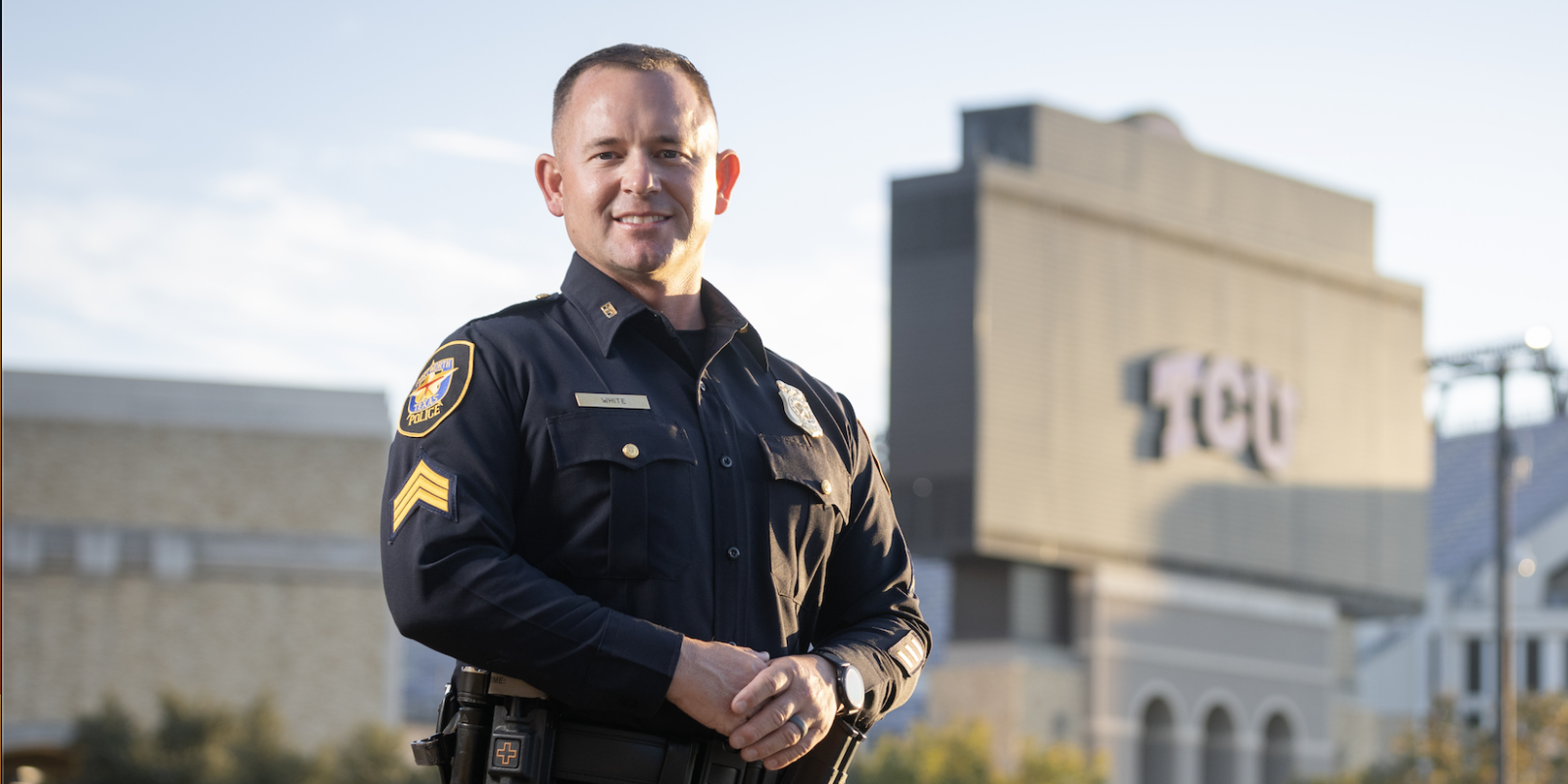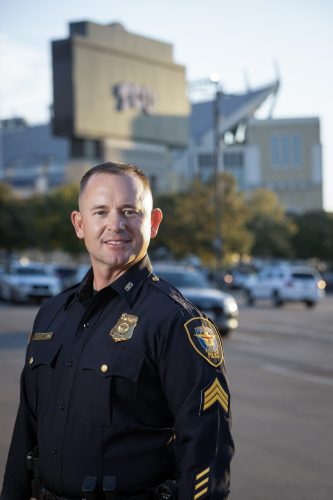
A chance conversation with Chancellor Victor J. Boschini, Jr. inspired Anthony White to pursue his master’s degree.
On Call for Justice
Anthony White’s passion for justice drives his police work, victim advocacy and teaching.
During his Introduction to Criminal Justice class, Anthony White ’18 MS shares gripping stories about human trafficking cases from his years of police work at the Fort Worth Police Department. He dispels the misconception that human trafficking primarily involves kidnapping or physical force. Instead, White emphasizes that traffickers more often use psychological tactics like fraud, manipulation and threats to coerce victims into commercial sex or forced labor.
White’s passion for educating the next generation of criminal justice professionals springs from two decades in law enforcement. His career has brought him to TCU regularly over the last two decades, from working security at football games as a police officer to earning his master’s in criminal justice and criminology to his current role as an adjunct instructor.
LAW ENFORCEMENT PATH
White joined the Marine Corps after high school, serving for eight years, including a deployment to Iraq. Afterward, he became a Fort Worth police officer in 2005, drawn by the opportunities in a large, diverse city department close to his hometown of Granbury.
He started as a patrol officer in the Fort Worth Police Department’s West Division, which includes the TCU area. He earned his bachelor’s in criminal justice administration from Tarleton State University in 2015 while working on the department’s Special Response Team, which targets violent crimes.
In 2016, White co-founded Assist the Officer Fort Worth, a nonprofit that provides financial assistance to first responders facing income losses from serious injuries or illnesses. Hector Melendez, who worked alongside White on the Special Response Team for a decade, serves as co-chairman. Melendez called the foundation a “tool we can use to help officers when they’re in really dire need.”
STOPPING TRAFFICKING
It was after White’s 2017 promotion to detective with the Major Case Unit, where he investigated human trafficking crimes, and his appointment to the U.S. Homeland Security Human Trafficking Task Force in 2018 that his life’s mission came into focus: seeking justice for victims whose lives were shattered.
“Human trafficking really rips someone’s soul from their body. They’re never the same person they were before,” White said. “As a detective, I think it was very important that we connected victims with services, counseling and nonprofit organizations to help them recover.”
Melendez said he admired White’s toughness and compassion. He recounted how White sought assistance for homeless individuals rather than jail time for minor offenses.
“Human trafficking really rips someone’s soul from their body. They’re never the same person they were before. As a detective, I think it was very important that we connected victims with services, counseling and nonprofit organizations to help them recover.”
Anthony White
“He was the kind of officer that was always wanting to help people,” Melendez said. “He knew how to work well with all different kinds of people.”
Emily Eibel ’21 MS, the outcomes specialist for Alliance for Children, a nonprofit that protects victims of child abuse, said White became her “go-to detective” for cases involving juvenile trafficking.
“I knew I could always count on him when I reached out, whether it was an on-call emergency case or simply a kid we had concerns about,” Eibel said. “Working sensitive and high-priority cases can be draining or even frustrating as you try to put all the pieces together. … But having a dedicated detective like Anthony makes the process effortless.”
Eibel identified one particularly complex, long-running human trafficking case that showed White’s dedication to the victim.
“There was never a time where Anthony wasn’t aware of everything going on,” Eibel said. “Even though he had many other open cases happening at the same time … he would put his all into every case and be that person in their corner for whenever they were ready to come forward.”
JOINING THE FROG FOLD
A chance encounter with Chancellor Victor J. Boschini, Jr. in a campus parking lot sparked White’s postgraduate journey at TCU.
“I was heading over to the rec center to work out and he saw me in police uniform,” White recalled. “He said, ‘You need to be a Horned Frog.’ So I started looking into the program with the criminal justice department, and I knew that I had to do it.”
White earned his master’s in criminology and criminal justice from TCU in 2018. He said his TCU education elevated his approach as an investigator, helping him look beyond individual cases to deeper societal issues underlying trafficking and other crimes.
“TCU helped me become a more analytical thinker,” White said. “I wanted to dive deeper into the why and the root causes of crime. For example, I would talk to the traffickers and ask, ‘Why do you choose that path instead of getting a real job?’ ”
White also cherishes the connections and experiences of being part of the TCU community.
“Some of my most fond memories will be taking my wife and kids to the Fiesta Bowl and taking my son to the National Championship game out in Los Angeles,” he said. “My whole life revolves around TCU, from working the games, seeing my students there and my kids growing up bleeding purple.”
Since 2019, White has taught the Introduction to Criminal Justice class and Controversial Issues in Policing at TCU, sharing insights with students across majors such as business, journalism and nursing.
“I had such incredible professors that truly cared for me and were there for me,” he said. “I wanted to give back to the university that helped me so much. I wanted to make an impact on the next generation of professionals in all industries to teach them about criminal justice.”
PERSEVERING AFTER TRAGEDY
While White has found fulfillment in his work, his journey has not been without hardship and loss. In 2018, White’s close friend and fellow officer Cpl. Garrett Hull was killed in the line of duty.
“That really changed my perspective on life and made me realize how short and fragile it is,” White said. “I don’t take things for granted, and I really try to spend a lot of time with my family and make memories.”

In addition to his duties as a police officer, Anthony White is an adjunct instructor at TCU.
His current role as a police sergeant in the Northwest Criminal Investigations Unit, which oversees investigations into property crimes and metal theft, allows a reprieve from the heavy emotional tolls of human trafficking work.
White shared some of the lessons he has learned since graduation:
Self-care is vital to a successful career. First responders experience firsthand a significant amount of trauma and stress during a 25-year career. Taking time away is crucial for recharging and maintaining my mental and physical health.
Trust your instincts. Your gut feeling, rooted in years of experience, is often accurate and can be the difference in making sound judgments and going home safe.
Never stop learning. As the world changes around us in terms of new laws and technology, we must continuously be willing to learn and adapt so that we can effectively serve the community.
Lead by example and have compassion for your colleagues. Leaders in all industries have a responsibility to enhance workplace morale and strengthen trust and cohesiveness within their organization.
Be ever present for your family and always give thanks to God.

Your comments are welcome
Comments
Related reading:
Alumni, Features
Crowdsourcing Can Lead to Solving Crimes with Police
Johnny Nhan analyzed how citizens banded together on platforms like Reddit to find the Boston Marathon bombers.
Features, Research + Discovery
Don Greenwood Explores How Social Workers Can Help Stop Human Trafficking
Advocates can better link survivors with new sources of support.
Research + Discovery
Faculty Find Human Trafficking Through Massage Parlors
Two researchers are following the trail of demand that leads to smuggled and exploited people.